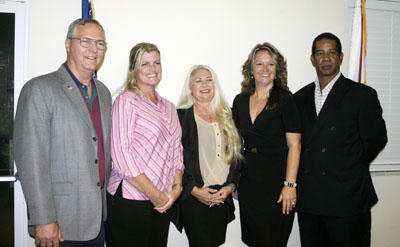By Briana D’Andrea
The South Florida Water Management District is one step closer to developing its long-planned levee in between the J.W. Corbett Wildlife Management Area and The Acreage.
The Indian Trail Improvement District Board of Supervisors gave the green light to a quadrant agreement and temporary construction easement for the project at a meeting Wednesday, Aug. 6.
However, SFWMD officials will have to present how the levee will affect seepage rates in the area in order to gain the board’s full support at next month’s meeting.
The easement grants a revocable right of entry for the SFWMD to maintain its pumps over the Corbett area, ultimately helping to reduce the threat of a levee break, which was a major issue in the aftermath of Tropical Storm Isaac in 2012.
Gov. Rick Scott budgeted $4 million in support for the levee last year, after the SFWMD lobbied in Tallahassee for it.
“This agreement does not require any capital contribution, which is what was previously required from us. There’s no money coming from Indian Trail to South Florida Water Management. That has been completely removed,” explained Ruth Clements, director of land acquisition and land management for the SFWMD.
Clements said the project would also leave the nearby Moss property alone, an issue many residents were concerned with.
“It’s the north 70 feet of that south path, but it does not extend into the impoundment and then giving them access to the Moss property,” she said. “We’ve preserved that.”
The Florida Fish & Wildlife Conservation Commission and the SFWMD have been working collectively on the 5-year project for some time, since Isaac swept through The Acreage, causing overflowing canals and major flooding.
ITID Engineer Jay Foy says the project has its pros and cons. “The surface water flow will still be the same. The ground water seepage has a current daily rate of 61.5 cubic feet per day, and it will go down to about 38.6 per day,” Foy said. “It probably won’t affect the wells, but it has the potential to lower your water tables. The disadvantage is there will be seepage, but not as much.”
ITID Supervisor Michelle Damone said she supported the project and was ready to move forward. “The Corbett area was detrimental to The Acreage during Isaac,” she said. “This is something the residents and the taxpayers of The Acreage deserve.”
However, ITID President Carol Jacobs expressed her doubts with the design. “I’m not comfortable. We cannot make a mistake when it comes to water,” she said. “We’re all on wells out here. There are water wars out there, so I would like one more month to do a little more background.”
The seepage rates were a cause of concern for ITID Supervisor Ralph Bair. “If Corbett gets like a lake, the animals won’t have a place to go except the dike,” he said.
Several residents also had issues with the project.
Alex Larson was worried that it could harm well water in The Acreage. “I don’t want to be forced to live on city water, but if our water goes down enough, or if one place gets contaminated, we’re in trouble,” she said. “I really want you to think about this. They’re not giving you any details in the documents I read.”
Alan Ballweg, a candidate challenging Bair in this year’s election, also called for caution. “A 39-percent reduction in the flow is highly significant,” he said. “This needs to be studied. I think that perhaps the simple phrase ‘subject to review and approval of design’ can be added to the documents.”
Supervisor Gary Dunkley said he moved to the area because of the well water, and he would hate to see the wells become stagnant. “We can’t just give them a carte blanche,” he said. “I don’t want to take a chance on doing something that will harm us environmentally.”
Supervisor Jennifer Hager said it was important to focus on what the documents were asking of the board at the moment.
“This is for work on the berm, and the reason why we are fixing it is because it was in disarray from Isaac, and that’s what this is for,” she said. “The word revocable means that we can come in any time we feel like it and say you don’t have access.”
A balanced seepage condition was added to the motion for approval, which then passed.
The issue is slated for a more in-depth presentation and discussion at the next ITID board meeting on Wednesday Sept. 10 at 6:30 p.m. at the district office.
ABOVE: The Indian Trail Improvement District Board of Supervisors.








